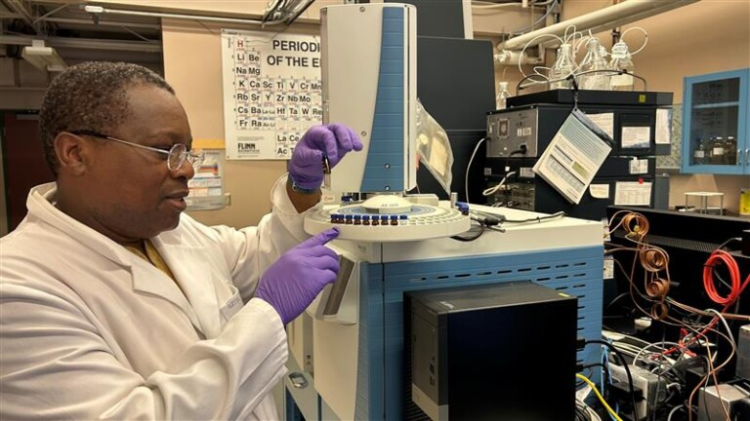Martin Mkandawire, a professor of chemistry at Cape Breton University, has dedicated his career and research to tackling pressing health and environmental challenges. Now, he and his research team are leading a project that could revolutionize the detection of skin cancer. By using saliva as a liquid biopsy, they aim to create a non-invasive, rapid testing method that could make early detection more accessible, particularly in communities where diagnostic facilities are limited.

Dr. Mkandawire's interest in cancer research is both professional and deeply personal. His wife, Dr. M. Mary Mkandawire, an accomplished molecular biologist, introduced Dr. Mkandawire to nanomaterial-based cancer imaging and therapies early in his career. Together, their work developed beyond conventional imaging, sparking his drive to explore new diagnostic technologies. Having lost his father to cancer and experienced his own skin cancer scare, Dr. Mkandawire was motivated to find ways of making early detection more widely available.
"If my father had access to early diagnostic tools, things might have been different," says Dr. Mkandawire. "Unfortunately, he lived far from cancer diagnostic facilities, which motivated me to leverage my research skills to develop early and rapid detection."
The idea for the project was born from a convergence of expertise. Dr. Mkandawire's background in ultrasensitive sensors and his wife's research into liquid biopsies and biomarkers sparked a new focus: using saliva to detect early signs of skin cancer. By creating a rapid, easily collected test, their work could save lives and ease the burden on healthcare systems.
"What excites me is that we are not just doing science," Dr. Mkandawire says. "We are doing science to address key issues facing our society."
Empowering a New Generation of Scientists
Supported by a RISE grant, this research is both an innovative step forward in cancer detection and an opportunity for CBU students to gain hands-on experience in cutting-edge science.
"I recommend that our institute continues to support research through the RISE Grant, without which this research would not be possible," says Dr. Mkandawire.
One of the most inspiring elements of this research is the role played by CBU students. Here, undergraduates are often tasked with responsibilities usually reserved for graduate or postdoctoral researchers at larger institutions.
"We involve the student in more than just being a research assistant," Dr. Mkandawire says. "For example, our students learn to operate highly advanced equipment and apply sophisticated research techniques, which are typically reserved for graduate students in large institutions."
Students are involved in every step of the process, from lab management and experiment design to instrumentation and scientific discussions. This hands-on experience provides meaningful learning opportunities that prepare them for future careers in science.
"Our research group fosters extensive mentoring and an inclusive environment that encourages learning without fear," Dr. Mkandawire explains. "Students are allowed to explore their abilities within the project's context. As a result, they build confidence and develop teamwork, communication and writing skills."
The Road Ahead
The project is a truly collaborative effort, with partnerships extending beyond CBU to Nova Scotia Health, ÉTS (École de Technologie Supérieure | Université du Québec) in Montreal, Avicenna Research Services in Toronto and the Fraunhofer Institute in Germany. These collaborations provide essential infrastructure, like cleanrooms (a space where particles like microbes and other such contaminants are controlled to maintain a sterile research environment), for developing the sensor.
Collaboration has been central to the project's success, both through external partnerships and within CBU. Dr. Mkandawire highlights the diversity of expertise on his team, noting that colleagues and students bring essential contributions that shape the research at every stage.
"I am fortunate to lead a wonderful research team, comprised of dedicated and talented individuals who are all actively contributing to our research. They truly do the heavy lifting," Dr. Mkandawire says.
The team is currently in the early stages of their work, refining the nano-sensor used to detect cancer biomarkers while testing with artificial saliva. The next phase will involve testing with real saliva samples, which will require ethical approvals and the recruitment of volunteers. But as Dr. Mkandawire says, this is only the beginning, and the potential implications of this research are huge, especially considering Cape Breton University's small size when compared to other research institutions.
"The success of this research in developing an early, rapid detection system based on identifying biomarkers in saliva could save lives, improve health outcomes and increase the economic efficiency of healthcare delivery," says Dr. Mkandawire. "We hope that people, whether here on Cape Breton Island, in Nova Scotia or across Canada, will gain confidence in the abilities of Cape Breton University and its researchers to contribute to society and drive technological progress, despite CBU's size and limited research resources."













